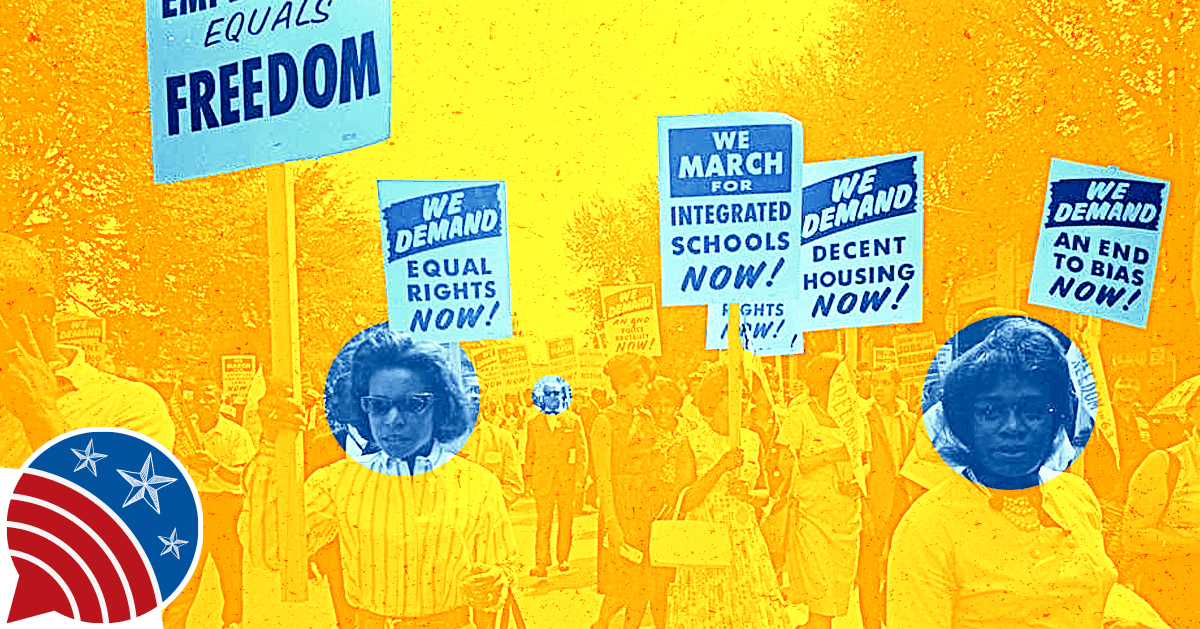
Civil Rights
Since its founding, the Constitution has been used, challenged, and made more perfect. All of this has been done to secure civil rights for groups whose rights have not always been protected. Explore the history of civil rights in America from its founding to today. How did Reconstruction amendments, civil rights legislation, and court cases like Brown v. the Board of Education shape the evolution of American civil rights? What issues still remain today? Prepare to engage in discourse on our country’s history with civil rights and what that means today and in the future.
Podcasts & Videos
Brown v. Board of Education: Civil Rights, Part 4
Instructions
- Watch and listen to the 60-Second Civics video below. If you'd like, you can also read along using the script that appears below the quiz. Or you can turn on the video's subtitles and read while watching the video.
- Take the Daily Civics Quiz. If you get the question wrong, watch the video again or read the script and try again.
Episode Description
Dr. Donna Phillips: Welcome to 60-Second Civics, the daily podcast of the Center for Civic Education. I'm Donna Phillips. Today, we continue our series on civil rights as part of the Civil Discourse: An American Legacy project. We are joined again today by special guest Dr. Lester Brooks, American history professor emeritus from Anne Arundel Community College. Welcome back Dr. Brooks.
Dr. Lester Brooks: Thank you for having me.
Dr. Donna Phillips: Sure thing. Dr. Brooks, what was the impact of the Brown v. Board of Education decision for civil rights?
Dr. Lester Brooks: In 1954, the U.S. Supreme Court in the Brown v. Board of Education decision said that segregated schools were unconstitutional. Now, this is a case where there was a complaint filed against the Board of Education of Topeka, Kansas, and essentially it overthrew the Plessy v. Ferguson case of 1896 that established the separate but equal doctrine. However, the Brown decision only overthrew segregation in the field of education.
There were other areas of American society that still had to be that, where there were still petitions and still protests to bring about the end of segregated facilities; segregated transportation; voting rights.
Dr. Donna Phillips: Thank you. That's all for today's podcast. 60-Second Civics, where civic education only takes a minute.
Dr. Lester Brooks: Thank you for having me.
Dr. Donna Phillips: Sure thing. Dr. Brooks, what was the impact of the Brown v. Board of Education decision for civil rights?
Dr. Lester Brooks: In 1954, the U.S. Supreme Court in the Brown v. Board of Education decision said that segregated schools were unconstitutional. Now, this is a case where there was a complaint filed against the Board of Education of Topeka, Kansas, and essentially it overthrew the Plessy v. Ferguson case of 1896 that established the separate but equal doctrine. However, the Brown decision only overthrew segregation in the field of education.
There were other areas of American society that still had to be that, where there were still petitions and still protests to bring about the end of segregated facilities; segregated transportation; voting rights.
Dr. Donna Phillips: Thank you. That's all for today's podcast. 60-Second Civics, where civic education only takes a minute.






